- Home
- Elmore Leonard
Freaky Deaky Page 21
Freaky Deaky Read online
Page 21
That's what could happen to you associating with geeks. You could get hurt and fired or, in Harry Dean Stanton's case, get shot off a fence in Beverly Hills.
Right after Harry Dean's geek partner drove off at the end of the picture, going down a highway on his way to hell, Skip heard somebody downstairs. A minute later Robin was in the room. She came over to Skip on the couch, kissed him on the head and he thought to himself, Look out.
"You're moving," Robin said, stepping over to the TV to turn it off. "Let's get your clothes and your dynamite."
He asked her how come.
On the phone a couple of times she'd mentioned this guy Mankowski, the suspended cop, and Skip didn't like the sound of him. What she told now, about Mankowski knowing he was here, he liked even less, saying to Robin, "I might just go back to L.A. You and Donnell could be cutting me out as it is, once I do the heavy work for you. I've an idea what you want, too. Find out where this Mankowski parks his car and wire it up."
"You'd do it, wouldn't you?" Robin said.
She hooked a leg over the flowery arm of thecouch, started fooling with his ponytail, and once again Skip told himself to look out.
"We haven't been able to talk much," Robin said.
Skip knew that. He waited.
"Donnell wants to cut you out."
Skip knew that too. It stood to reason.
"He thinks he's calling the shots, so I play along. You're going to be proud of me, the way I've worked it out."
Skip let her play with his ponytail.
"I have to call Donnell before we leave," Robin said. "See if he'll do us a favor."
Skip kept quiet. Let her talk.
"We do need him. At least till Monday morning when the bank opens. Donnell wants one million even, he likes all those oughts, as he says. But our take has to be less than his because he's the brains. You believe it? I said fine, we'll go in for seven hundred thousand."
"That's a familiar number," Skip said.
"Our original idea. But if you have no objections let's go for the whole thing."
"Cut Donnell out."
"It wouldn't be hard, the way I see it work."
Skip began to relax, feeling a little better about his one-time old lady.
"Sweetheart, tell me how we get paid."
"Woody gives us a check."
Skip grinned at her. "You're cuckoo, you know it?"
Robin was shaking her head and stroking her braid at the same time. "Monday morning, as soon as the bank opens, Woody calls the Trust Department and has a million seven transferred to his commercial account. We see him do it, so we know the check's good."
"We're holding a gun on him, or what?"
Robin shook her head, giving him that faint smile, and Skip closed one eye, looking up at her, trying to see if there was a hole in her idea. This was kind of fun.
He said, "Well, shit, Woody can stop payment any time right after."
Robin said, "Not if he's dead, he can't."
Skip said, "Uh-huh, and if you don't see giving Donnell his share . . . I suppose there's a big explosion of some kind and the two of them are found underneath the rubble."
Robin said, "Hey, there's an idea."
Skip looked down the road, thinking about it. "The cops find out we took a check off him for a million seven. . . . It has to be made out to one of us and we put it in a bank. You don't just cash a million seven. They're gonna find it out."
Why was she grinning at him?
"The check isn't made out to either of us," Robin said. "It's pay to the order of--you ready? Nicole Robinette."
It took Skip a moment. "That's you, huh? Your book name."
"Woody doesn't know it yet," Robin said, "but he's buying theatrical rights to all four of my novels, herein referred to as the 'Fire Series.' Diamond Fire, Emerald Fire--"
"Jesus Christ," Skip said.
"Gold Fire and Silver Fire. I'm meeting a lawyer," Robin said, looking at her watch, "guy I used to know. He's coming to his office on Saturday as a special favor. I typed up a Purchase Agreement and Assignment of Rights, pretty much boilerplate, from standard contracts I picked up when I worked in New York. He'll look them over, make sure they're okay."
Skip said, "This guy owe you one?"
"I'm going to pay him," Robin said, "if he asks. Maybe he will, I don't know."
"I bet you make sure he doesn't."
"Anyway, we get Woody's signature on the contracts, so it looks legit, for after. Okay, we deposit his check in Nicole Robinette's account and then--listen to this--I write checks payable to you and me in our own names, and a couple of the names we used when we were underground. Like good old Scott Wolf will get a check. What do you think?"
"I liked being Scotty Wolf," Skip said, "he was a nice guy. That other one I used--the hell was it? Derrick Powell--when I was living in New Mexico. But, shit, those I.D.s're old, they've expired."
"For a million seven," Robin said, "I'll bet we can think of ways to get them renewed, or make up new ones. I'll have to reactivate Diane Young and Betsy Bender."
Skip said, "Man, I remember Betsy Bender, with her 'fro. That motel in L.A. off Sunset. I wouldn't mind bending her again right now." He softened his eyes at Robin, waiting to give her a nice grin.
But she wasn't looking. Robin got up from the arm of the couch sounding like she was thinking out loud, telling him she was going to have to make up contracts between the fake names and Nicole Robinette. For different services the fake names provided. Otherwise the bank would report the deposit to the IRS and Nicole would owe . . . Christ, at least five hundred thousand dollars. Or she'd make up invoices or some goddamn thing, from the fake names to Nicole.
Skip watched her turn and head for the phone now, by her mom's canopied bed.
"I almost forgot. I have to call Donnell."
Skip said, "How do you like it?"
Robin dialed before she looked over. "How do I like what?"
"Being in the straight world."
* * *
Mr. Woody, seeming almost of sound mind but wet-eyed drunk, hooked onto the word "codicil" from somewhere in his past life, telling Donnell that's what it was, a codicil, like an addendum. You didn't scribble a codicil, it was a legal document and ought to be typewritten.
So they had to look through the cabinets in the library for the typewriter: found a favorite flashlight the man had misplaced; found tapes of monster movies, from when he was on that kick; came across the black athletic bag that had been put there by Mankowski, Mr. Woody wanting to know what was in it and Donnell telling him it was just stuff in there, nothing important. He put the typewriter on the desk and started copying what he'd written yesterday in longhand--about the man leaving him at least two million if and when he ever died--taking forever, looking for each letter as he poked the keys. So the man said to let him type it. He sat down and fussed, abused the typewriter, reading with his wet eyes as he typed, but damn if he didn't get it done. Finished, pulled the sheet out of the typewriter and signed it. There it was, scrawled right at the bottom in big loops, Woodrow Ricks.
Donnell picked up the sheet of paper and kissed it, the man not looking, stumbling away from the desk, starting to take his clothes off for his afternoon swim.
The phone rang.
Donnell slipped that lovely codicil into a desk drawer, picked up the phone and heard Robin's voice say, "Hi, it's me. How you doing?" He told her he couldn't talk now. But she was in a hurry and said she needed a favor, asking him if he could get somebody to do a job. He told her just a minute and put his hand over the phone.
"Mr. Woody, you take off your clothes at the swimming pool. Go on now. I be right there."
The man shuffled out and Donnell kept his hand on the phone a while longer thinking, Shit, the man could fall in the pool and drown and it would be too soon. The lawyer had to get the codicil first and put it in the will. Then the man could fall in the pool and drown or drink himself to death or hit his head on the toilet. . . .
So he hurried talking to Robin and agreed, okay, to get somebody, yeah, uh-huh, saying he understood when Robin said, "We want to take him out, but not all the way," and let her tell him why it wouldn't be good to have Skip do the job, risk his getting busted. Not at this point, blow the deal. Donnell had questions he didn't ask. He told her he'd see. Robin said he had to do more than see, he had to get somebody. She said this was crucial and Donnell said all right, he'd do it, but right now had to do something else. Hung up and ran down the hall to the swimming pool.
The man was already in the water, a scene of peace and contentment, floating naked on the rubber raft, fat little hands flapping at the water, barely moving him. . . . See? Everything was fine. Beautiful.
The man's voice raised to call. "Donnell?"
"I'm right here."
"I want Arthur Prysock instead of Ezio Pinza."
"I don't blame you."
"For a change."
"Yes sir, you got it."
" 'On the Street Where You Live.' "
"One of my favorites too, Mr. Woody."
What was wrong with this street where he lived, this house? Sit and wait for the man one day to take his last drink, throw up and die. What was the hurry to have a lot of money if he wasn't going anywhere? He believed he could trust Robin to give him his million out of the check, scare her ass not to think otherwise. This Skippy he'd have to see about. Best now to keep it moving, get it over with and done. Million seven, all the different kind of money accounts and shit the man had, he wouldn't even miss it. . . .
Sleeping on his rubber boat, Arthur Prysock running his voice up and down the street, belting the shit out of that old tune. Donnell brought the phone from the bar to the table and dialed a number.
He said, "Juicy, tell me what you been doing," and listened to this young dude growl and breathe animal sounds into the phone, in a bad mood after visiting the pink room up in Homicide, sitting hours in that closet while they asked him the same shit.
Donnell said, "You out of work, you out of finances. I have a man for you needs to be vamped on. Tell me what you charge to bust his leg, put him in the hospital about a month."
Juicy said, "I'm tired."
Donnell said, "Take you two minutes from the time he gets out of his Cadillac. Polack name Mankowski, not near big as you."
Juicy said, "Mankowski, shit, I know that name, that man's a cop."
Donnell straightened him out. The man was suspended, didn't have a badge or a gun no more, was out of business.
Juicy said, "They took his gun, huh? . . . He's the motherfucker let Booker blow hisself up."
Donnell said, "I thought was you and Moselle did that."
Juicy said, "I wasn't there. You understand? He was there, I wasn't. He let it happen to my man. Yeah, I'll bust his legs good."
"Just one."
"I'll give you a deal for the same price. I'll put him away."
"Juicy?"
"I'll take him out someplace and lose his ass. Nobody ever see him again."
"Juicy? How much just for the one leg?"
Chapter 24.
Saturday afternoon Chris had time to kill, so he walked the few blocks from 1300 to the Renaissance Center and went to the show. He saw Lethal Weapon and watched how Mel Gibson took care of the bad guys; Chris thinking, So that's what you do, you shoot 'em. Mel Gibson played a burnout and supposedly didn't care if he got killed or not, which was harder for Chris to believe than how good Mel was with his fifteen-shot Beretta. Chris's pistol, the Glock auto, began to dig into his groin as he sat there, so he slipped it into his coat pocket in the dark of the theater watching Mel Gibson. Pretty cool for a burnout. Though he couldn't imagine a homicide cop being allowed to dress that scruffy, even in L.A. Homicide cops were dudes.
Eleven years ago, when Chris was working out of the Twelfth Precinct in a radio car, there were a couple of guys known as the pizza bandits, white guys who specialized in the armed robbery of private homes. One of them would ring the bell standing there with a pizza box; the resident would open the door to say he didn't order a pizza and the second guy would come out of the bushes wearing a ski mask. They'd punch out the man of the house, make the wife, if she wasn't too old, take her clothes off and fool around with her and then haul away the TVs, silverware, jewelry and so on. They were working through a home not far from where Woody Ricks now lived when the maid got a chance to call 911. It was given to Chris and his partner, robbery in progress, and when they arrived Chris went around to cover the rear while his partner called for backup. Two cars came to assist, the second one wailing, its flashers on, and the pizza bandits dropped what they were doing and ran out the back door. Chris saw guns in their hands and came a hair away from firing. But he didn't, he put his .38 on them and said, "Right there. Don't move," thinking of other things he could've said. Freeze. Drop the guns. They stopped dead, both guys. Chris raised his voice a notch. "Don't move." One of the guys spoke up fast. "It's cool," in an urgent tone of voice. "Nobody's moving." Chris raised his voice another notch. "Don't fucking move a muscle!" The first guy screamed back at him, "I'm not moving, man! Look at me!" As the second guy screamed, "I'm not fucking moving!" That was the way it happened, three guys in a backyard at night holding revolvers, all of them scared to death one of the guns was going to go off. Two nights later Chris answered a call, disturbance in a working-class neighborhood, a family argument. He and his partner walked into a house and here was a guy in his undershirt drunk out of his mind holding a gun on his wife, a woman in hair curlers and a ratty pink housecoat, crying, her nose running. . . . That time Chris kept his voice down, saying to the guy, "You don't want to shoot your wife. Give me the gun." Didn't want to shoot his wife--the guy was dying to shoot her and he did, shot her twice before Chris grabbed the gun away from him, twisting it out of his hand. The woman suffered superficial wounds, went into Emergency that Saturday night and was out of the hospital Monday morning. The guy suffered broken fingers and a shoulder injury where his arm was yanked out of its socket and it kept him in therapy a year. When he had to quit his job at Detroit Forge and Axle he sued the city, the police, and retired to Deltona, Florida, on the settlement. Chris's precinct commander said, "Why didn't you shoot the son of a bitch?"
That's what Mel Gibson would've done, shot the drunk spot welder dead. Then you see Mel having to live with it and the next time he has to pull his gun he chokes when he should be squeezing off rounds and because of it he either gets shot or his partner does, the partner dies and so on.
Before leaving the theater Chris switched the Glock auto from his coat pocket back to his waist, the big grip against his belly. It was five thirty. He had a half hour, time to go across the street and have a couple. Get ready for his meeting.
Late Saturday afternoon, hardly anybody in the place, you could see what Galligan's looked like; you could see the booths, the posters and photographs on the walls, the brass rail separating the tables from the bar. Chris got a bourbon mist. A guy with a convention badge and a New York accent told him he was attending the dry cleaners show at Cobo Hall. He said he thought Detroit only had shot-and-a-beer joints, this place could be on Third Avenue, Upper East Side. Chris told the guy Detroit had everything: at least one of each. The guy said yeah, was that right? Chris excused himself; he had to make a phone call.
When he was living with Phyllis and they used to meet here after work she'd say, "Hi, guy," or "Hi, love," or once in a while, "Hi, tiger," and he'd feel like an asshole in that five o'clock press of young execs and secretaries turning to see who the tiger was. Phyllis wasn't trying to be funny, she was serious. It was her idea, after spending all day in the Trust Department of Manufacturers National Bank, of being hip. Phyllis knew who Sigourney Weaver was, but not Doodles.
When she answered the phone and he said hi, Phyllis said, "Hi, guy. I've been wondering when you'd call."
He could see her in a silky negligee holding the phone in the crook of her neck, hair up, foot on a chair, cotton balls
wedged between her toes.
"I want to ask you something," Chris said.
"If you had called yesterday--no, Thursday," Phyllis said, "I might've given in, asked you to come home. I was feeling sort of down, to tell you the truth. Chris? We did have some laughs, didn't we?"
He tried to think.
Living with Phyllis, most of the time it meant watching her get ready: Phyllis bathing, painting her nails, anointing her big-girl body with lotions, putting on flimsy, see-through undergarments that showed dark places. . . . He gave her a pair of musical panties one time; you pressed the rose and it played the theme from Love Story--"Where do I begin, da da da da da da da . . ."--which got a laugh, but not much of one. Undergarments were her vestments. But then she'd "dress for power," as she called it, cover that soft white body in a business suit, and go off to the bank.
He began to say, "Phyllis . . . ?" but she beat him.
"I met a guy yesterday, Chris."
Then paused, and it intrigued him just enough that he said, "Yeah?"
"A neat guy. Bob owns quite a large plant in Fort Wayne, Indiana. They manufacture dry-cleaning solvents, dyes, spot removers. . . ."
Chris said, "I guess somebody has to."
Phyllis said in her grave tone, "That isn't fair, Chris."
"What isn't?"
"Taking how you feel out on Bob. Listen, I'm really sorry it didn't work. I tried, I'm sure you did too. It's just one of those things."
"Just one of those crazy flings," Chris said.
There was another pause.
A trip to the moon on some kind of wings. Gossamer.
"I think I detect a certain tone," Phyllis said. "I know you, Chris. I know when you're upset. Your friend Jerry told me what happened and I thought, Oh, the poor guy. On top of everything else."

 Charlie Martz and Other Stories: The Unpublished Stories
Charlie Martz and Other Stories: The Unpublished Stories Elmore Leonard's Western Roundup #2
Elmore Leonard's Western Roundup #2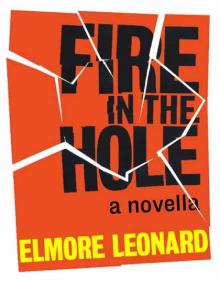 Fire in the Hole
Fire in the Hole Tishomingo Blues (2002)
Tishomingo Blues (2002)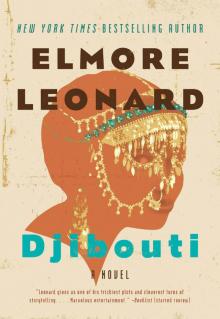 Djibouti
Djibouti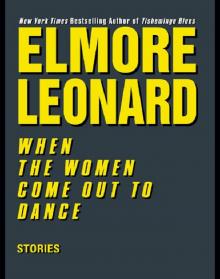 When the Women Come Out to Dance: Stories
When the Women Come Out to Dance: Stories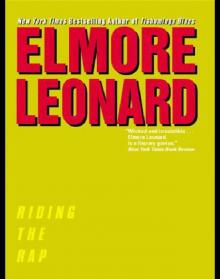 Riding the Rap
Riding the Rap Moment of Vengeance and Other Stories
Moment of Vengeance and Other Stories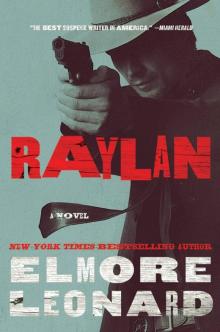 Raylan
Raylan Touch
Touch Mr Majestyk
Mr Majestyk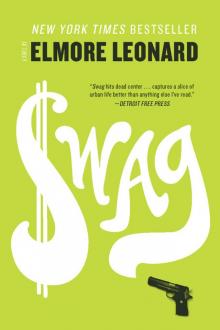 Swag
Swag Road Dogs
Road Dogs La Brava
La Brava The Hot Kid
The Hot Kid Valdez Is Coming: A Novel
Valdez Is Coming: A Novel Be Cool
Be Cool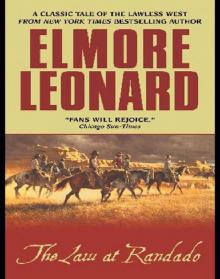 The Law at Randado
The Law at Randado The Bounty Hunters
The Bounty Hunters When the Women Come Out to Dance
When the Women Come Out to Dance 310 to Yuma and Other Stories (1953)
310 to Yuma and Other Stories (1953)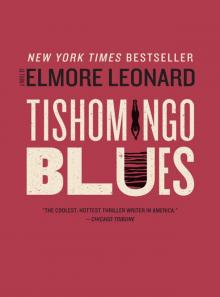 Tishomingo Blues
Tishomingo Blues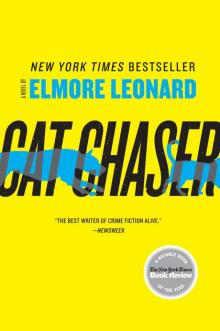 Cat Chaser
Cat Chaser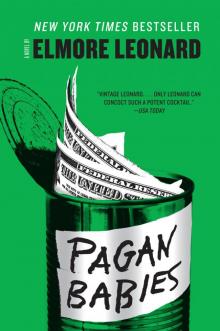 Pagan Babies
Pagan Babies Elmore Leonard's Western Roundup #1
Elmore Leonard's Western Roundup #1 52 Pickup
52 Pickup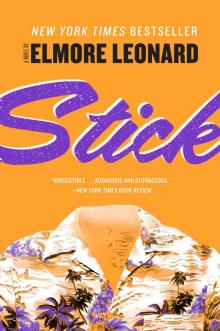 Stick
Stick The Moonshine War
The Moonshine War Valdez Is Coming
Valdez Is Coming City Primeval
City Primeval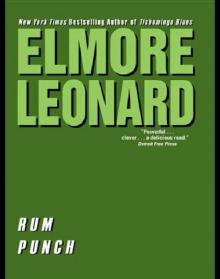 Rum Punch
Rum Punch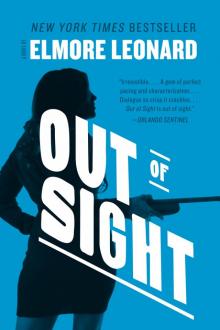 Out of Sight
Out of Sight Naked Came the Manatee (1996)
Naked Came the Manatee (1996) Killshot
Killshot Cuba Libre
Cuba Libre Forty Lashes Less One
Forty Lashes Less One The Complete Western Stories of Elmore Leonard
The Complete Western Stories of Elmore Leonard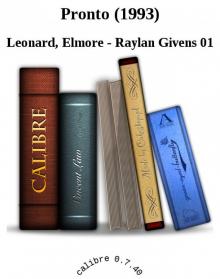 Pronto
Pronto Split Images
Split Images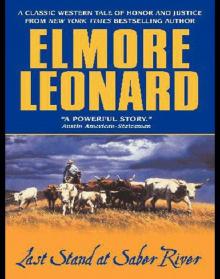 Last Stand at Saber River
Last Stand at Saber River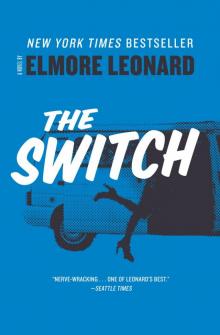 The Switch
The Switch Three-Ten to Yuma and Other Stories
Three-Ten to Yuma and Other Stories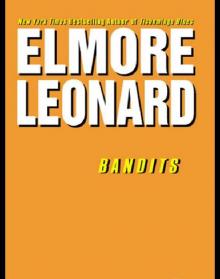 Bandits
Bandits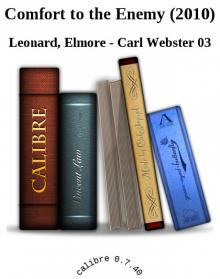 Comfort to the Enemy and Other Carl Webster Stories
Comfort to the Enemy and Other Carl Webster Stories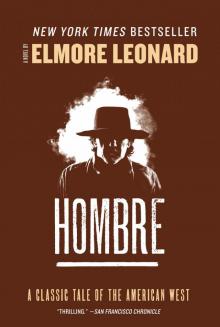 Hombre
Hombre Trail of the Apache and Other Stories
Trail of the Apache and Other Stories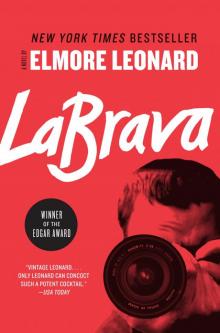 LaBrava
LaBrava Gold Coast
Gold Coast Jackie Brown
Jackie Brown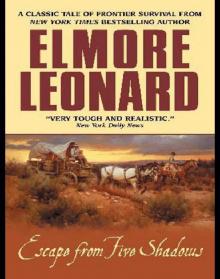 Escape From Five Shadows
Escape From Five Shadows Karen Makes out (1996)
Karen Makes out (1996)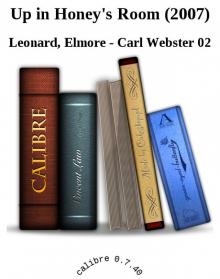 Up in Honey's Room
Up in Honey's Room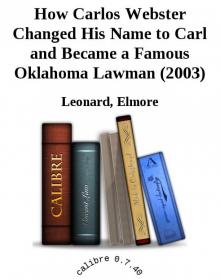 How Carlos Webster Changed His Name to Carl and Became a Famous Oklahoma Lawman (2003)
How Carlos Webster Changed His Name to Carl and Became a Famous Oklahoma Lawman (2003)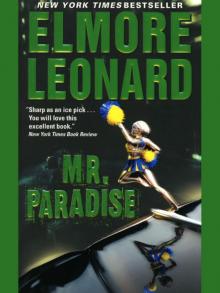 Mr. Paradise
Mr. Paradise The Hunted
The Hunted Freaky Deaky
Freaky Deaky Louly and Pretty Boy (Ss)
Louly and Pretty Boy (Ss)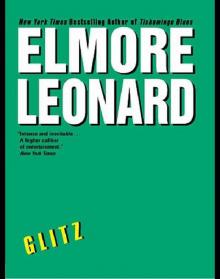 Glitz
Glitz A Coyote's in the House
A Coyote's in the House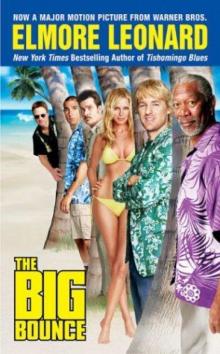 The Big Bounce jr-1
The Big Bounce jr-1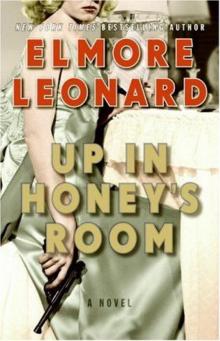 Up in Honey's Room cw-2
Up in Honey's Room cw-2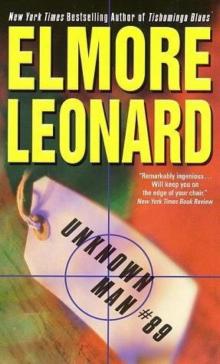 Unknown Man #89 jr-3
Unknown Man #89 jr-3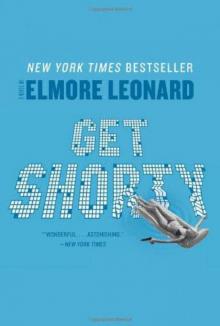 Get Shorty: A Novel cp-1
Get Shorty: A Novel cp-1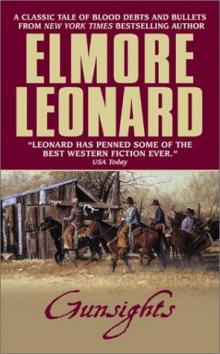 Gunsights
Gunsights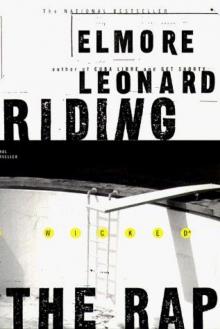 Riding the Rap rg-2
Riding the Rap rg-2